Neon Genesis Evangelion: Science vs God
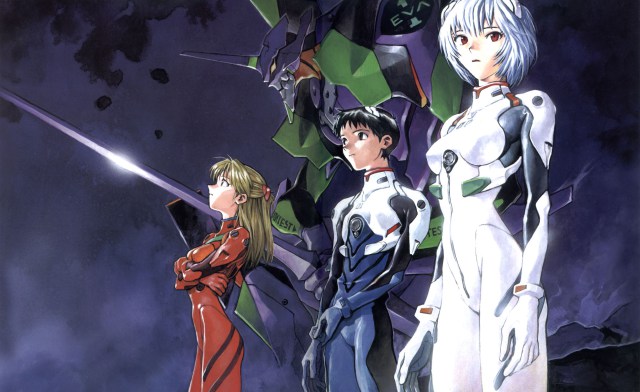
Neon Genesis Evangelion generally falls into the category of anime in which you either love it or you hate it. Be it because it is over-hyped or the fact that it hasn’t aged well, it is generally a hit or miss for those new to it. Another key reason for this is that the anime gives the impression that it has a complex story. However, the majority of this complexity is due to its delivery. Granted, the meaningful imagery and themes are so abundant that it takes repeat viewings before someone will pick up on just a portion of them, but the story itself is told in its entirety with its ensuing exposition. As odd as it may be, the series’ combination of red herring imagery and its abstract method of character introspection is one of the core reasons many people got into anime. This is because with its mysteries and open-ended plot, Neon Genesis Evangelion is a thought provoking anime that triggers some deep philosophical questions on our origins and self-worth.
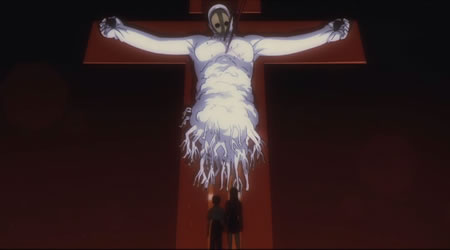
God, Religion and Cruelty
With a title like ‘Evangelion’ and elements like crucifix-shaped explosions, the Lance of Longinus and the bad guys being called Angels along with many other allusions to Christianity, one might think that these elements would trigger the viewer’s curiosity in this religion, but there is a saying that ‘nothing makes an atheist faster than reading the bible’. This comes double for anyone who watches fantasy or sci-fi anime. As after reading the bible, as well as many myths that came 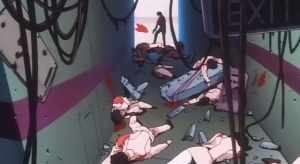 before it, one might notice similar magical elements between scripture and fantasy, leading them to think that the text is a work of fiction. Yet thinking certain religious texts are fictional shouldn’t be enough to stop them from believing in a God. After all, there are both Gods without religions like in Pantheism and religions without Gods like in Buddhism. Not being religious himself, the director Hideaki Anno used elements of Christianity to represent character growth and emotional issues that occur in the anime.
before it, one might notice similar magical elements between scripture and fantasy, leading them to think that the text is a work of fiction. Yet thinking certain religious texts are fictional shouldn’t be enough to stop them from believing in a God. After all, there are both Gods without religions like in Pantheism and religions without Gods like in Buddhism. Not being religious himself, the director Hideaki Anno used elements of Christianity to represent character growth and emotional issues that occur in the anime.
Neon Genesis Evangelion and its concluding film are brutal, especially for its main characters and, without spoiling any particulars, it doesn’t have the happiest of endings either. If one were to relate these horrific events to the horrific events that happen to real people around the world it might lead viewers down a similar path as Epicurus’ Paradox:
Is God willing to prevent evil, but not able?
Then he is not omnipotent.
Is he able, but not willing?
Then he is malevolent.
Is he both able and willing?
Then whence cometh evil?
Is he neither able nor willing?
Then why call him God?
To summarize, if there is a God and he is all-powerful then he is cruel to A LOT of people, and, even if he’s not cruel to anyone in particular, would you still worship a cruel God? But just because people might not worship a cruel God, working in mysterious ways or otherwise, it still doesn’t determine whether this cruel God exists or not. The anime stresses the need for a balance as the main character resolves to keep on living in the hope of experiencing happiness along with suffering.
Scientific Evidence and the Burden of Proof
Without a basis for the belief in a God through a religious text, if one concludes them to be fictitious, nor a basis through morality, thinking God to be cruel, what foundation does one have to believe this idea on other than faith? It is through Neon Genesis Evangelion’s affinity to science, which we see through the Magi super-computers, characters like Rei Ayanami and Ritsuko Akagi and the Evas, that themes of likelihood and man’s comparisons to God’s arrogance becomes relevant. It is references to the ideals of evidence that shows how it is only the things we are ignorant about or misunderstand, such as the Angels, that are truly threatening to us. The point of science is to have evidence to observe reality, and without evidence the only thing keeping a belief tied to reality is faith. As with most narratives, it is the main characters’ ignorance in Neon Genesis Evangelion that triggers the most emotionally devastating backlashes.
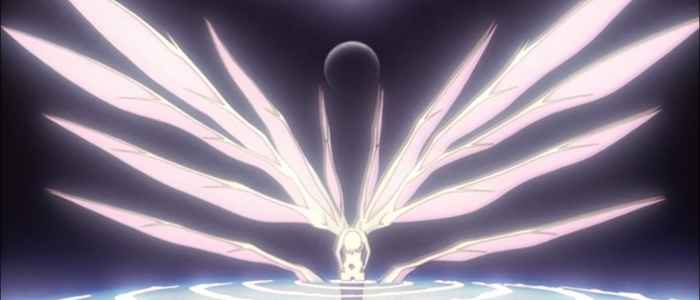
Philosophical statements in Neon Genesis Evangelion on the fragile nature of truth raises the question; ‘If my truth is not based on evidence, couldn’t I believe anything undetectable to exist on the same basis?’ There are countless things one could believe to exist based on this premise, the different ideas of Gods being only a few examples. When we are given a look of what a God could be during The End of Evangelion, did you wonder if this is how other people imagined God? How would they have justified it? In the end, the question on beliefs should come down to what’s more likely to be true, things that have an observed consensus or mass subjectivity? For those who decide to stick with subjectivity, it is important to know that it is up to you to prove this claim and not the ones who deny it, and also that not knowing is no reason for believing (also known as the argument from ignorance or god of the gaps). As Bertrand Russell stated on the burden of proof,
“Some people speak as if we were not justified in rejecting a theological doctrine unless we can prove it false. But the burden of proof does not lie upon the rejecter…. If you were told that in a certain planet revolving around Sirius there is a race of donkeys who speak the English language and spend their time in discussing eugenics, you could not disprove the statement, but would it, on that account, have any claim to be believed? Some minds would be prepared to accept it, if it were reiterated often enough, through the potent force of suggestion.”
Death of the Author

The director of Neon Genesis Evangelion has stated multiple contradictory things about the show from saying that he only “used it [the Evangelion title] because it sounded complicated” to saying that “there’s obviously a deeper meaning” but that he’s “not going to spell it out for you [the fans]” and that they should figure it out for themselves. In other words, like with God, people are encouraged to adopt their their own views on it. Like a Rorschach painting, you need to create your own meaning in the places where the answers aren’t just given to you and from this creativity, you learn more about yourself in the process. This is stated beautifully at the end of the series when the characters say:
“It’s only the mind which separates reality from truth. Any new position from which you view your reality will change your perception of its nature. It’s all literally a matter of perspective. There are as many truths as there are people. But there is only one truth that is your truth. That’s the one that’s formed by whatever point of view that you chose to view it from. It’s a revised perception that protects you. That’s true. And one can have a perspective that’s far too small. However, a person can only see things from the perspective that they chose to see them from. One must learn to judge things via the perceived truths that one receives from others. For example, sunny days make you feel good. Rainy days make you feel gloomy. If you are told this is so, then that is what you believe is so. But you can have fun on a rainy day as well! Your truth can be changed simply by the way you accept it. That’s how fragile the truth for a human is.”
In the end, this is the core philosophy of what makes Neon Genesis Evangelion so important and it is this line of dialogue that helps people to understand the subjective nature of reality and their own beliefs.
Works Cited
Bury, J. B. (1914). History of Freedom of Thought. London: Williams & Norgate. p. 20.
Epicurus’s Paradox, Larrimore, Mark Joseph (2001). The Problem of Evil. Wiley-Blackwell. p. xix–xxi.
Neon Genesis Evangelion, Hideaki Anno, Gainax 1995
The End of Evangelion, Hideaki Anno, Gainax 1997
What do you think? Leave a comment.







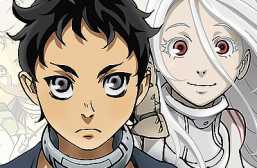
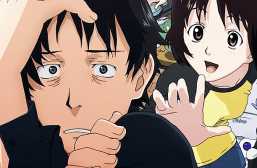
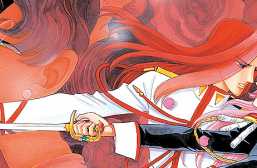

This article goes in full detail about a meaning we all have thought about at one point. “Is their a God to truly be worshipped” I certainly say yes in some cases and no because it’s deeper than God himself. We have this perception or idea of the word fate. Things happen for a reason and simply put what you do to others you get back out. When it comes to this anime, I remember when I watched it a long time ago I got sucked into the story of how the main character would go through these emotions and trigger certain actions that protected everyone. I thought that was an interesting point. Feeding off emotions in the real world can be positive or negative depending on the situation and if your not careful with how you choose to show that emotion things can end up bad for both parties.
Indeed, believing in god is definitely a case by case basis.
This article is an incredibly good reason why Eva is considered one the greatest anime series ever made (or the greatest, according to some). We are breaking it down to piece even to this day.
Yes, analyzing Eva in their own way is something most anime fans should get around to.
The symbology is really mostly window-dressing as far as I’m concerned, but it does contributes to the overarching impact of the series.
I would say that some of them, particularly things relating to the characters growing up e.g. menstruation, is very important for understanding the characters and what they are going through which I believe contributes to the overall impact of the series.
I never really liked it too much. I can respect what it did for the industry (though honestly for every advance it made that I liked it made one that I hated… for instance I really wish we didn’t have so many characters based off Rei), but I never got into it.
As I mention in the first paragraph, it can be a hit or a miss.
The show is very, very dark. And the message is very negative.
I think the show does create a depressing environment. However, I think this is part of the appeal of the series.
Depends what message. I think the ending message of living through pain to experience happiness as well is a very positive message.
Well the creator does have some serious mental health problems and that worked it’s way into the plot and keep in mind this was orginally intend as a kids show so he really did go off the rails.
Still though at the end of the day it is just a TV show and teenager or an adult shouldn’t suffer any harm from it unless they have some pretty serious underlying mental problems.
I disagree actually, at least for the end of the TV show, the message is very positive, even if it’s presented through a very abrasive series of events leading up to the ending. The message given to viewers at the end though is that one shouldn’t throw their own lives onto other people, but instead realize that they themselves have worth and take charge of their own lives.
Also the idea that one should connect and relate with others without being afraid of being hurt.
The reason End of Eva is so bleak is more because Anno lashing back at negative fan reactions to the end of the TV series.
I really liked Neon Genesis Evangelion when I first watched it. After having watched a lot of different anime series before this one, I was very surprised at the depth of the characters. What caught me the most was probably the idea of truth, and how subjective it is. In a way, it makes the theme less depressing and more enlightening.
I agree, I thought this message said a lot of about the series and was the one I found most important as well.
The anime’s message as a whole is left to the viewer’s interpretation, I can agree with that. However, episodes 25 and 26, which the studio released quickly to finish the series on short notice, is some of the most straightforward Japanese animation you will ever watch. Every word in those two episodes literally spells out the intent of the theological and transhumanist themes within the series.
Without necessarily following the logic presented in those two episodes, it is easy to discern the writers’ opinion that both truth and God can be found through introspection. Perhaps they did not intend to convey the message so bluntly, but they did not intend to be canceled so early, either.
You might be right about the budget constraints, however, I found what they accomplish message-wise in those two episodes to completely change the way I looked at the rest of the series.
The science vs. God conversation is a touchy, difficult one. It’s interesting to see that conversation happening through anime.
Trust me, there are entire blogs dedicated to this conversation.
It’s only difficult and touchy for the believers.
I honestly prefer the Rebuild movies, as they cut out the whining and keep in the good stuff.
They still have a lot of the whining.
After I watched this I must admit my mind was filled with ideology, concepts, and symbolism that id never thought about before.
That’s Eva for you.
I was expecting a logical ending, which explains everything else.
Lol, blown were your expectations.
One of the best anime. The way the whole puzzle comes together into one big Rorschach test that you have to figure for yourself is astonishing.
I’m very glad to see some people got the point of it.
There are a lot of big explosions shaped like crosses and giant monsters named after Abrahamic angels, but those symbols are apparently bereft of meaning. That is a shame. If the show had more time to develop, this could be something worth exploring further.
I wouldn’t say bereft of meaning. People apply there own meaning to what they see, but if you are going by what the director said a lot of his statements have been contradictory on the subject as shown in the last paragraph.
For those that would like something that’s sorta similar but not as dark and without the overt references God, I would suggest RahXephon.
Watched RahXephon, it’s even more confusing (Complex) than Eva. Not saying that’s a bad thing, I just still can’t figure that anime out.
Really, personally I felt it was just a poorly executed knock-off of Evangelion that had great potential especially in the first few episodes but slowly degenerated into a love story that felt like it was shoehorned into the show. The plot is for the most part internally consistent, but poorly explained to the viewer.
I have never watched Neon Genesis Evangelion before, but this article defiantly make me want to go watch it. What I found most interesting is that the creator of Evangelion was going through depression during the making of the show, and I guess that shows in the end product. I’ll get to watching it whenever I get the chance.
Yeah, though it’s kind of vague what point of the production he went through you can definitely see ripples of it in the series.
I think this is a thorough understanding of a surface theme. NGE is more complex than simply the comparisons of religion and technology after seeing it three times (which isn’t nearly enough to understand the show 100%!). I think it should be noted that Hideaki Anno suffered from a plethora of anxieties and suffered from many downfalls in life prior to, and during, the production of Evangelion which contributes heavily to the theme of God forsaking (or even trying to kill) mankind, along with the development of characters but that doesn’t relate to the topic. Having so many discussions with people about NGE, the religion and technology themes seem less significant in unraveling the show’s vast array of themes. In the end it is still a more clear-cut and understandable analysis, and is just as important.
If readers want a similar show as far as underlying themes and character development, Yura Kuma Arashi is the closest you would find (on the surface it is completely different, but has themes of religion as well as many other themes, some of which not touched in NGE) but it has a much higher cost of entry. I mean, the show’s title translates to Lesbian Bear Storm, why would someone want to watch that!?
Anno’s illness was something I was contemplating adding to article but I could find enough evidence to back up what exactly or when exactly he suffered it. If you have any solid statements on these, I will most definitely try to add them.
In conclusion, the stuff masterpieces are made of.
P-much.
The last 3 episodes are completely psychological and irritating.
Different strokes.
To this day I still can’t figure out why everyone seems to love this show so dearly. The symbolism is all meaningless, throwing in forced religious references.
I guess you fall under the miss of a hit or miss category then.
I like Evangelion but the last episode and the movies truly sucked! And to be honest it’s not in a very good genre since it’d supposed to be about giant robots but instead consintrate on character develoment. Also trying to watch it a second time is extremly boring.
What?s wrong with a show that has characters that aren?t wooden and two-dimensional? I think that is what makes it stand out as one of the greats of that genre…
There is nothing wrong with it. But what I was trying to say was that there was an unbalance between the giant robots fighting to kick some alien ass and the main charcter dealing with his socialy retarded problams. I like the development of the heros it really makes you care but as a result the action suffed. The fights don’t last very long, and ‘Spoiler’= In End Of Evangelion I was expecting Shinji to totally beat the fucking shit out of the rest of the EVA’s. But instead he just breaks down and lets the world get destroyed!’ If the same amount of develoment could be keep and have a good amount of action then I wouldn’t complain. But the truth is that the action was takin away for the story. One anime that has a good balance between story and action is Giant Robo. Simply put Evangelian lacked action.
When a show shatters viewer expectations the reactions are generally mixed so you can see why their are so many different views on EoE.
Evangelion isn’t about the robots. It’s a story of self-discovery, coming of age and all the struggles that go with it, and so much more.
This show is truly a work of art and well worthy of the praise it gets.
I see you fall under the hit category of the hit or miss demographic.
I wonder how a Christian would judge Evangelian with all the religious things.
Haha, it really depends on what subdemographic of Christians, there are quite a few of them and their views on things like this are quite different.
You have made a very interesting analysis from the religious symbolism perspective and the scientifical.
Well, I’m glad the post lived up to the title.
I remember whe i had seen this anime at first time. I was really exciting!!!
I was also really exciting, too much!
Eva units basically run on Freudian logic…
Hah! I get it, mothers! Good one.
Interesting post. However, some ideas about God are wrong here. God is not the creator of evil; He allows evil to happen, but that is not the same as Him being evil. God IS able to erase evil, and He is willing at the same time. So why doesn’t He? Because He understands the value of suffering. He permits certain evils to exist so that we might become stronger through suffering, and so that we might better understand ourselves and come to know Him. Jesus Himself (who is God) underwent plenty of suffering, and all of it had meaning. We also need to remember that, according to the Bible, it was satan and HUMANS that brought evil into the world; God did nothing wrong. He gave Adam and Eve free-will, a gesture of love, so that they could choose to love or not to love, and they misused their free-will, and thus evil in the world spawned.
God is not the source of evil. He permits it, both because we choose it, and also because it presents multiple ways for us to grow stronger, know Him better, and prove our love.
I don’t I ever used the word evil. It might have been in the Epicurus’s Paradox but, as shown in the references, those are not my words. I also clearly stated that this belief, if you have it, shouldn’t be something to stop someone from believing god, so what you saying is not really a disagreement with this article.
I saw guess I was reacting off of the word “malevolent”.
That is fine that my comment isn’t a disagreement with your article. I just wanted to explain the way things really are. That’s all.
Great article!
But the word “malevolent” is also only used in the Epicurus’s Paradox quote in this article also, so yeah, no my words.
Yeah, I missed that…
This Anime is really awesome.
Oh yesh.
I personally feel that the story is very tragic.
Some parts of it are, I agree.
The ending made no sense.
The ending definitely agrees with your assertion that the creator wants to leave it to our interpretation
They added a whole bunch of Gnostic and Christian symbolism to make the atmosphere “exotic”. That’s what I remember of the God related shenanigans.
I like that they went for it. Evangelion commits to its aesthetic. That’s nice. Also the mechs scream and bleed – fun for everyone.
Neon Genesis Evangelion is a highly impactful anime that what I thought was another mecha anime, was in fact one of the most puzzling anime that left me dazed, not necessarily in a good way. I was frustrated by the last 2 episodes and the End of Evangelion movie, with all the seemingly meaningless symbolisms and collages of scenes thrown everywhere. But hey, good art doesn’t necessarily have to elicit positive reactions, right?
This reminds me of a simple statement told to me by a friend. I asked him how his day was going and he responded: “I’m having a great day! Everyday is a great day as long as I make it that way!” I’ve come to realize that the “facts” of what life is and how we consume it are entirely based on how we individually frame it. Being optimistic is taking what you see everyday and determining it to be great. Being pessimistic is taking what may be normally positive and viewing it negatively. We have the power to essentially be the gods of our own perceived world and how it affects us. I’ve only watched through EVA once, but after reading your article I’m excited to dive back into it and digest the philosophical meanings within it.
I have been told that the religious elements in NGE was just the creators screwing around with the western audience. Gerald Rathkolb from the Anime World Order podcast told me in a recent podcast episode I do that Gainax added the christian thematic elements to test how well the western audience would know it. They assumed that since the western or American world has Christianity as part of their culture and society, they would realize it was all nonsense from the start. Well, they got a kick that even to this day, people are STILL trying to tie everything about Evangelion. I thought after 15 years since I found out about Evangelion and watched it for the first time and would read on what people thought on the internet,I thought this debate was over and done with, I guess not.
Now, if you want someone who actually adds biblical references to serve a greater good in his films and media, Mamoru Oshii is someone that incorporates the Bible in his works to serve to the characterization and plot of a story like Angels Egg, Mobile Police Patlabor, and Ghost in the Shell. If you want to sink your teeth into biblical elements in anime, Oshii is the guy you wanna look at.
I just joined this site, and i’m trying to finish a bottle of whiskey, so don’t mind me, i’m in a good mood.
I use to be furious if anyone said the religious iconography in NGE was anything but totally arbitrary. . . I mean I still think that, but I’m less of a dick about it now. The problem I have with making the claim is there really isn’t anything deeper, in my opinion, then the name? So your mech’s are named Eve’s? So what? That’s just humans naming something, or attaching meaning to something that doesn’t otherwise have any meaning. Sound familiar? Although, maybe that’s the purpose. To show that humans want to attach meaning to things.
Well that’s one interesting perspective